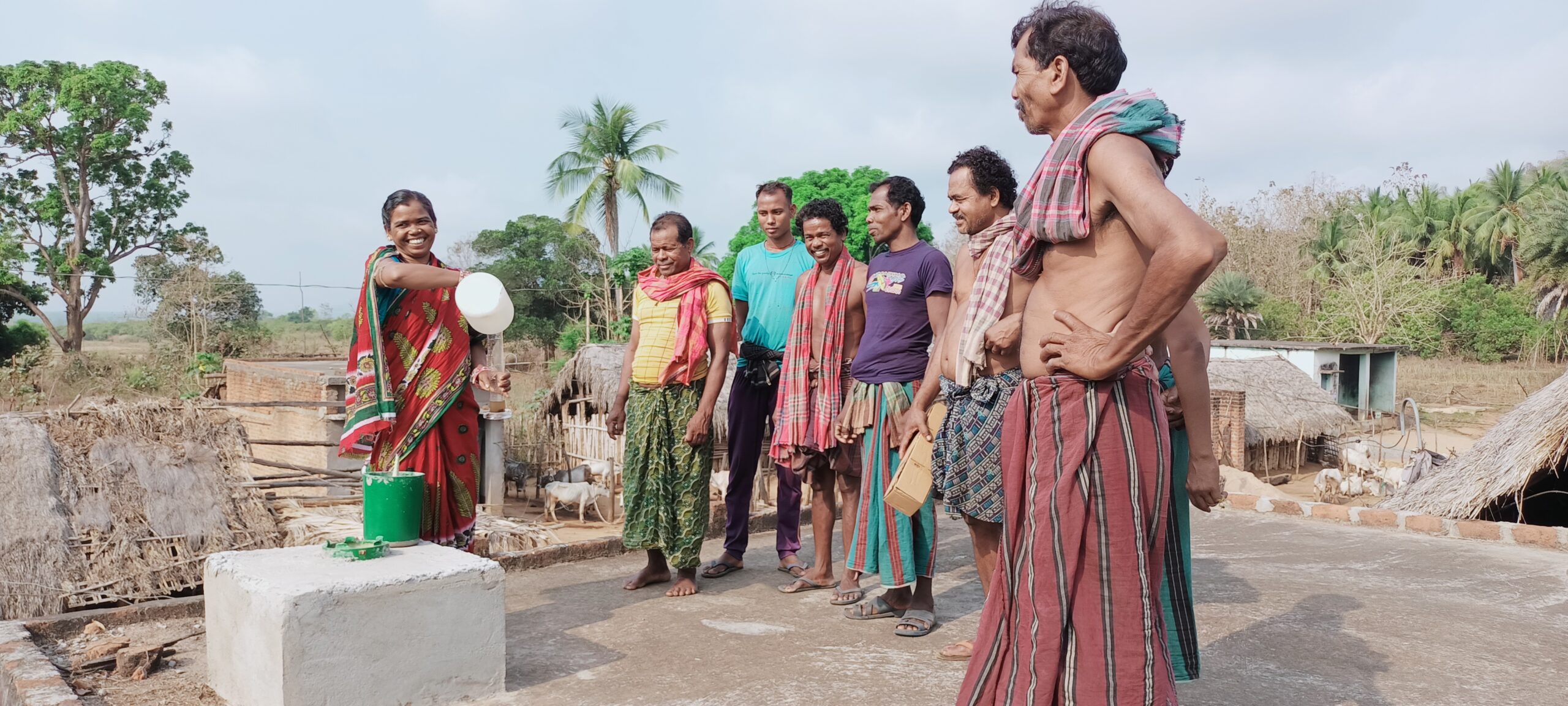Rural communities measure rainfall for long-term water security
StoryBy Chandrika Patnaik
16 April 2022
Rural communities in remote Odisha learn to use the manual rain gauge to predict rainfall and optimise water use for long-term water security affecting lives and livelihoods.

Santi Jani is demonstrating the measurement of the rainfall.
Photograph by Prasanta Kumar Naik
Santi Jani, 45, President of Gramadebati Village Development Committee feels that no one understands water woes during summer better than her. “Water woes due to water scarcity takes us two steps back. The taps in our homes running dry during summers can be frustrating. In fact, the rainfall data we monitor will help us in understanding groundwater availability on a monthly basis.”
“Being a localised forecast, the rainfall data collected with the help of a rain gauge helps in deciding which crop to cultivate in which season,” says Uttam Jani, 42, a farmer from Gramadebati village in Jagannathprasad block in Ganjam district. He continued saying “We believe that monitoring of this data regularly over a period of time will help us in getting precision forecasts in coming years. Climate change is now a reality, and such localised accurate forecasts will help us increase our produce.”
The village uses a rain gauge to collect this data. A rain gauge is an instrument used to measure the amount of rainfall in a certain area over a period of time. The manual rain gauge is a simple device with a funnel that is used for collecting and channelling rain into a small container within the device. The rainwater is then poured into a measuring tube to take the reading. To get accurate precipitation data, the rain gauge device is set up in an open area away from buildings, trees, electric wires, or edges of roofs. The monitoring of data over a few years will provide a month-wise accurate forecast in advance. This will help farmers to choose the crops they want to cultivate or the amount of watershed activities that should be done for increasing the moisture of the soil.
Mangaraj Jani, is the trained volunteer who measures the rainfall data in Gramadebati village using a rain gauge. He takes the reading once in 24 hours and records the data by writing in a register and then uploading it on a smartphone application called mWater.
The community uses a borewell for supplying water to every household. Santi says that the compiled rainfall data will help them in the future to decide the duration of water supplied to households in a day during different seasons helping us save water. “This way, borewells won’t completely dry up if extraction of water is done judiciously. This would mean that households will get water supplied to them for a shorter duration because we will extract less water from the borewell. But at least, this will prevent women from walking long distances every time in the summer to fetch water from outside sources.”
Availability of water is an issue that communities face at varying levels of intensity, across rural areas of Odisha and Jharkhand. The manual rain gauge device allows a community to efficiently monitor the rainfall in their area. The data collected over a period of time allows village committees flexibility in creating water-focused development plans for their village. This small technological adoption provides regular, usable data to users at the micro-level to optimise for water use.
Mangaraj Jani, a trained volunteer in the community is setting up the rain gauge.
Photograph by Prasanta Kumar Naik
ACKNOWLEDGEMENT
Anas K.P, Junior Manager in the Water Resource Technology Group, and Prasant Kumar Naik, Thematic Coordinator, Documentation and Communication helped in collecting data for the story. Ganesh Chakravarthi edited the story.
ABOUT THE AUTHOR
Chandrika Patnaik leads content production within the Communications team in Gram Vikas.
RELATED BLOGPOSTS
Water ushers in a new dawn in the life of Raidih’s farmers
Raidih’s farmers embrace sustainable agriculture and irrigation advancements, heralding a prosperous, water-efficient era in farming.
Gajendra Sahu’s kitchen dreams find wings in his village Adri
Gajendra Sahu transforms his culinary skills into a thriving village enterprise, inspiring Adri’s youth.
From one farmer’s soil to another: how Lochan’s journey in Odisha can inspire us all
Discover how pointed gourd farming reshaped the future for a small-scale farmer in Odisha.